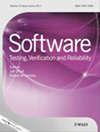CSSG: A cost‐sensitive stacked generalization approach for software defect prediction
IF 1.2
4区 计算机科学
Q3 COMPUTER SCIENCE, SOFTWARE ENGINEERING
引用次数: 8
Abstract
The prediction of software artifacts on defect‐prone (DP) or non‐defect‐prone (NDP) classes during the testing phase helps minimize software business costs, which is a classification task in software defect prediction (SDP) field. Machine learning methods are helpful for the task, although they face the challenge of data imbalance distribution. The challenge leads to serious misclassification of artifacts, which will disrupt the predictor's performance. The previously developed stacking ensemble methods do not consider the cost issue to handle the class imbalance problem (CIP) over the training dataset in the SDP field. To bridge this research gap, in the cost‐sensitive stacked generalization (CSSG) approach, we try to combine the staking ensemble learning method with cost‐sensitive learning (CSL) since the CSL purpose is to reduce misclassification costs. In the cost‐sensitive stacked generalization (CSSG) approach, logistic regression (LR) and extremely randomized trees classifiers in cases of CSL and cost‐insensitive are used as a final classifier of stacking scheme. To evaluate the performance of CSSG, we use six performance measures. Several experiments are carried out to compare the CSSG with some cost‐sensitive ensemble methods on 15 benchmark datasets with different imbalance levels. The results indicate that the CSSG can be an effective solution to the CIP than other compared methods.CSSG:一种成本敏感的软件缺陷预测的堆叠泛化方法
在测试阶段对软件工件进行缺陷易感性(DP)或非缺陷易感性(NDP)类的预测有助于最小化软件业务成本,这是软件缺陷预测(SDP)领域的一项分类任务。机器学习方法虽然面临着数据分布不平衡的挑战,但对这项任务是有帮助的。挑战会导致工件的严重错误分类,这将破坏预测器的性能。在SDP领域中,现有的叠加集成方法在处理训练数据集的类不平衡问题时没有考虑成本问题。为了弥补这一研究缺口,在代价敏感的堆叠泛化(CSSG)方法中,我们尝试将赌注集成学习方法与代价敏感学习(CSL)相结合,因为CSL的目的是减少错误分类成本。在代价敏感的堆叠泛化(CSSG)方法中,在CSL和代价不敏感的情况下,使用逻辑回归(LR)和极端随机树分类器作为堆叠方案的最终分类器。为了评估CSSG的绩效,我们使用了六项绩效指标。在15个不同不平衡程度的基准数据集上进行了CSSG与一些成本敏感集成方法的比较实验。结果表明,与其他比较方法相比,CSSG可以有效地解决CIP问题。
本文章由计算机程序翻译,如有差异,请以英文原文为准。
求助全文
约1分钟内获得全文
求助全文
来源期刊

Software Testing Verification & Reliability
工程技术-计算机:软件工程
CiteScore
3.70
自引率
0.00%
发文量
34
审稿时长
>12 weeks
期刊介绍:
The journal is the premier outlet for research results on the subjects of testing, verification and reliability. Readers will find useful research on issues pertaining to building better software and evaluating it.
The journal is unique in its emphasis on theoretical foundations and applications to real-world software development. The balance of theory, empirical work, and practical applications provide readers with better techniques for testing, verifying and improving the reliability of software.
The journal targets researchers, practitioners, educators and students that have a vested interest in results generated by high-quality testing, verification and reliability modeling and evaluation of software. Topics of special interest include, but are not limited to:
-New criteria for software testing and verification
-Application of existing software testing and verification techniques to new types of software, including web applications, web services, embedded software, aspect-oriented software, and software architectures
-Model based testing
-Formal verification techniques such as model-checking
-Comparison of testing and verification techniques
-Measurement of and metrics for testing, verification and reliability
-Industrial experience with cutting edge techniques
-Descriptions and evaluations of commercial and open-source software testing tools
-Reliability modeling, measurement and application
-Testing and verification of software security
-Automated test data generation
-Process issues and methods
-Non-functional testing
 求助内容:
求助内容: 应助结果提醒方式:
应助结果提醒方式:


